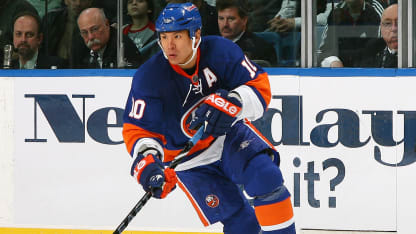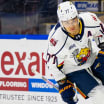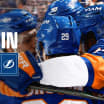It wasn't long before people around him realized he was good. Really good. TV crews from the US and Canada came to his local rink in Torrance do a story on him at age 11, and eventually, his coaches spoke to him and his parents about the possibility of moving to Canada to play more seriously. So Park left home (again) at 13 - this time to play hockey in Ontario. His older sister Christina agreed to go to college there, and Park lived with her. He played at De La Salle college with his brother, Horton, and from there moved onto the Belleville Bulls in the Ontario Hockey League.
Three years, 229 points, and countless bus rides later, Park was drafted 50th overall by the Pittsburgh Penguins in the 1994 NHL draft. He played for Pittsburgh, Anaheim, Philadelphia, Minnesota, and Vancouver, but Islanders fans remember him from his four seasons on Long Island from 2006 - 2010. Loved and admired for the effort he displayed every night, Park served as the Isles' alternate captain in 2008-09 and won the Bob Nystrom Award for leadership and dedication. Looking back, Park says, "I loved my time in New York - the coaches, my teammates, but especially the fans. People don't understand how passionate they are." And he says, the Islanders-Rangers rivalry is "still the best rivalry in hockey."
When the NHL lockout came in 2012, Park left to play in Switzerland for two years - his young family in tow. They loved living there, and Park said he is incredibly thankful for all that hockey has given him; but more than once he mentioned his appreciation for his family and what they've sacrificed to help him achieve his hockey dreams - both his parents and siblings as well as his wife and kids.
When Park returned to the States in 2014, he took a job the Wild offered him a job in player development, but before he could even begin in the land of 10,000 lakes, he got another job offer - one you might say he couldn't refuse - from overseas. Park is the second Korean-born player to play in the NHL. The first, Jim Paek, had just been asked to run the Korean National Hockey program, and his first call was to Park, who served as both assistant director and assistant coach. Together, they spent the next four years building a team for the 2018 Olympics. It's been a busy four years - between his family in California, the young players he was working with in Des Moines for the Wild, as well as trips to South Korea.





















